Ducati Panigale V2 vs Triumph Street Triple RS comparison
The Panigale V2 and Street Triple RS are very closely matched on the Madras Motor Race Track.
Published on Jun 27, 2021 07:00:00 AM
48,991 Views
Follow us on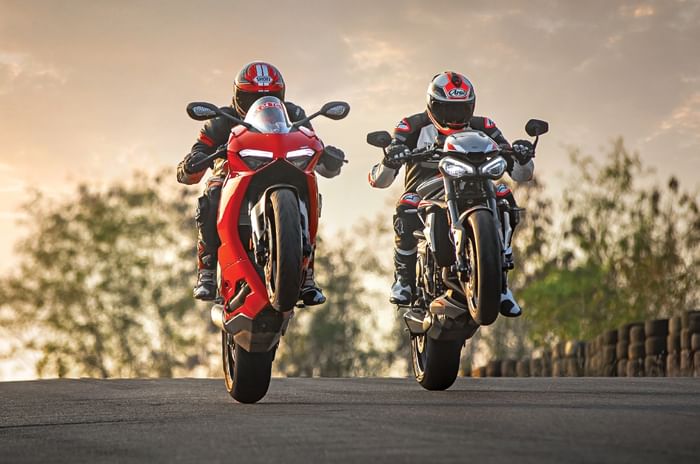
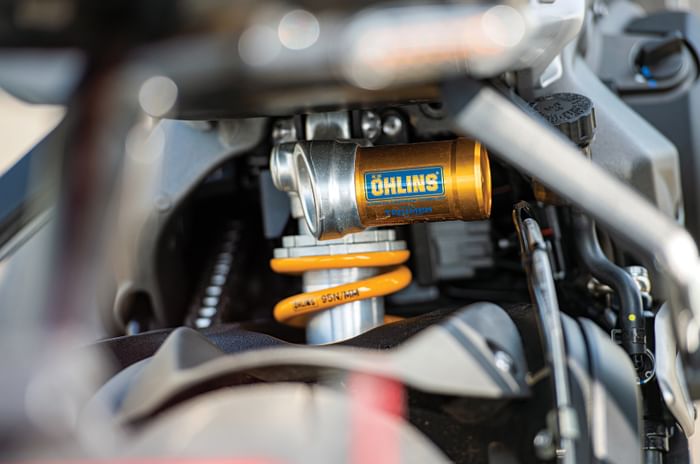
The Triumph gets an Ohlins suspension rear shock.
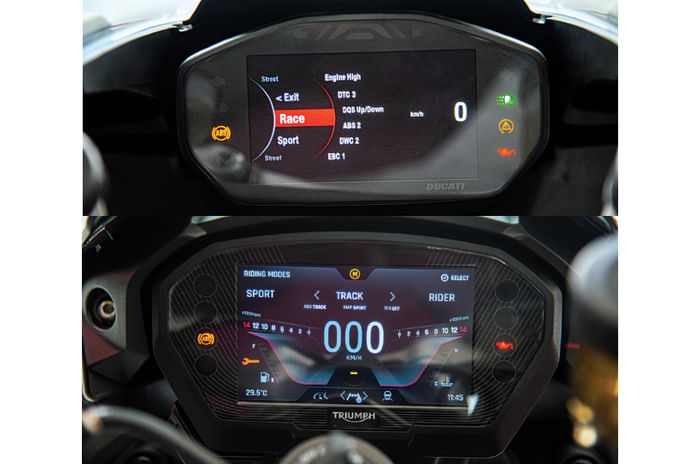
The V2’s TFT console is easier to read and the bike features a more comprehensive electronics package.
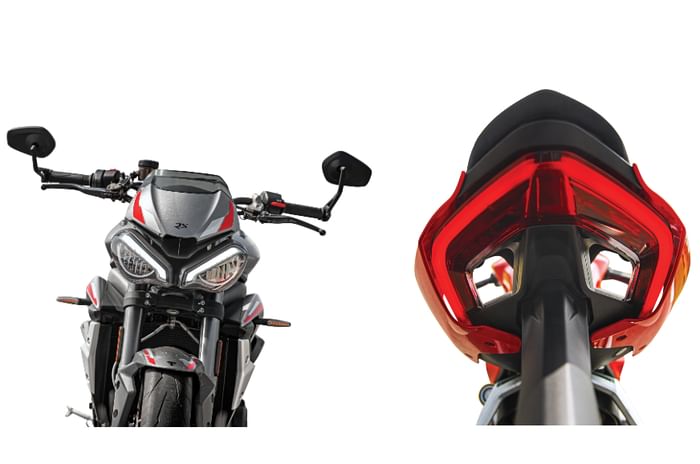
The Street Triple RS has an interesting bug-eyed face that may not be to everyone’s liking, but is rather unique.
I could think of a hundred different ways to start this story, but for me to paint the right picture, it takes just this one – Rishaad and I are blasting down the back straight at the Madras Motor Race Track (MMRT) on two stupendously exciting motorcycles. Hard on the brakes, Rishaad brings the Street Triple RS down to manageable corner entry speeds, and as I follow suit, the Panigale V2 that I’m riding steps its rear out into a glorious slide. The moments that make you feel like a better rider than you actually are don’t come by too often, and this was one of them. I took it all in, grinning away under my helmet, knowing that the last hour we spent, as the sun set on the MMRT, was going to be one I will reminisce about for days to come.
The setting was fairly simple: we were at the Autocar Track Day and the Ducati Panigale V2 and the Triumph Street Triple RS were two of the hottest launches in the last 12 months. They’re starkly different in form and, perhaps, even intent, but if you look past all of that, you will find that they’re both essentially cut from the same cloth; think cashmere of the bike world. There’s a lot of craftsmanship that’s gone into putting these bikes together (and I find that they do a remarkable job at warming you up from the inside as well).
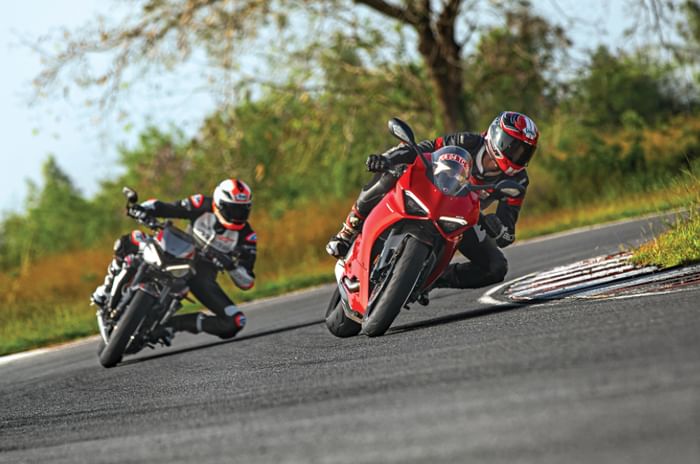
The Street Triple RS, ergonomically, isn’t as track-oriented as the V2 and it also has the smaller and less powerful engine. But, it comes with better suspension and brake hardware, and better tyres. The differences on a faster circuit like the BIC would have been bigger, but on a tight circuit like the MMRT and in the hands of Rajini Krishnan, the Ducati was only 0.8sec quicker – that’s what led to this comparison, and it’s a story entirely based around how these two feel on the racetrack.
DRESSED TO KILL
We both know bikes are about more than just the numbers, and so while their lap times were impressive, it’s not what defined them. For instance, the Panigale, in my opinion, is one of the most stunning pieces of art out there. From the time I saw the “Checkmate” commercial for the first 1199 Panigale, to when I brought home my own 959 Panigale, all the way to when I first caught sight of the V2 in the MMRT pitlane, the Panigale line has always brought out the little kid in me. In fact, nearly all of us from the team were stealing glances and, I am sure, have a few photos of the bike on our phones. The bike’s large red fairing, slim contours, and the gaps under the tail section are as functional, as they are aesthetic. And, for the first time on a “baby” Panigale, Ducati has used a single-sided swingarm and underbelly exhaust, making this bike all the more alluring and even harder to distinguish from its brute of a bigger brother.
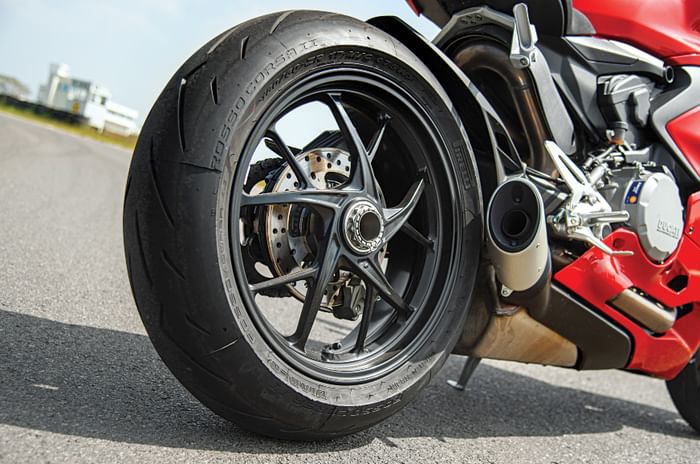
Things are a lot less ostentatious with the Street Triple RS. While even someone who’s not a bike enthusiast will instantly find the Panigale attractive, the Triumph, on the other hand, is more of an acquired taste. The build quality is one of the finest you’ll find on motorcycles and everything, from the paint job, to the stitching on the seat and the carbon-tipped exhaust, looks and feels premium to the touch. It is a good-looking motorcycle, no doubt, but it’s got its priorities in a different place.
THRILL MACHINES
For every visual aspect that the Panigale edges the Street Triple out on, the latter makes up for with top-notch equipment. Both bikes use a Showa upside down fork at the front (41mm on the ST-RS vs 43mm on the V2), but the Street Triple gets a Ohlins STX40 monoshock where the Panigale uses a Sachs unit. The Striple outshines the V2 in the braking department with higher-spec Brembo M50 calipers (M4.32 on the V2) and a fancier Brembo MCS master cylinder. It also outdoes the Ducati with the tyres, wearing super sticky Pirelli Supercorsas, while the V2 is equipped with more street-oriented Diablo Rosso Corsa IIs. All of this comes together to make one rather potent package.
It’d been a while since I rode a ‘big’ bike on track, and when you jump to higher levels of performance, it usually takes some getting used to. Surprisingly, I didn’t feel so with the Street Triple RS. I’d never ridden it before, but just a couple of corners in and I was overcome by a sense of familiarity that usually takes longer to achieve. I felt like a track maestro atop the RS; it’s that effortless to ride, and to ride fast. The Triumph’s engine has an additional cylinder over the Ducati, but it is smaller and makes notably less power and torque. It’s a deficit that is noticeable, but certainly not one that will hinder your thirst for speed. An exciting top-end sends the bike surging forward in a manner that’s very addictive, and this rush is only made sweeter by the bi-directional quickshifter. The V2 has one, too, and it’s one you’ll be using more often, considering the relatively lower ceiling on the rev band, and how quickly that engine revs. There’s also a more linear fashion to how the 955cc Superquadro L-twin puts down power – no sudden surges, and equally exciting from when you get on the gas, to the redline. Something else you’ll enjoy is the aural note from that underbelly exhaust that I mentioned earlier. There isn’t a recording on the internet that accurately captures how wonderful a Ducati twin sounds on the boil, and it’s the case with this one as well. The RS has that exciting triple scream, but the V2 rumbles and bellows like the skies are about to open.
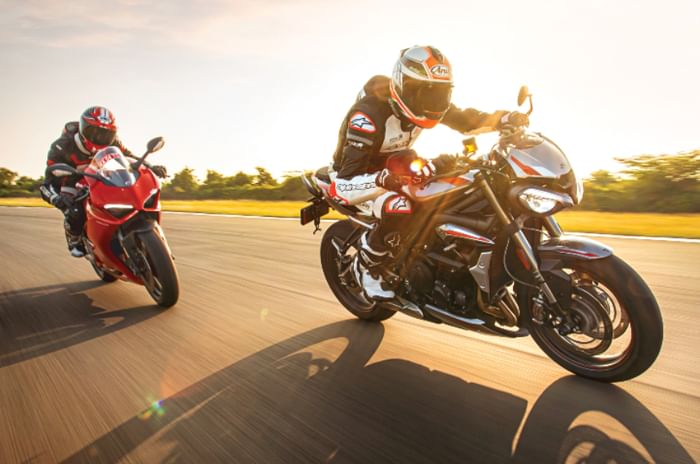
When it evolved into the V2, from the Panigale 959, Ducati made some minor tweaks to the chassis, like tipping the bike onto its nose a little more. The result – an improvement in handling, from what was already a pretty agile motorcycle. It’s like a bike on rails with a setup that you’ll have to fiddle around with very little to make it a full-fledged track machine. The RS, on the other hand, has a fair bit of street bike DNA in it and this is evident when you’re pushing hard. In its stock setting, the suspension is set to the softer side and the rear end does bounce about when you’re exiting a corner. And while it does have a fairly comprehensive electronics package, it’s not as seamless in its intervention as the Ducati’s. For instance, I popped the clutch on the Street Triple RS in an effort to get the front end to lift, but the traction control cut power delivery rather violently. I switched over to the V2 and tried the same thing, and while my attempt at a wheelie didn’t go as planned, it just continued to surge forward rather unbothered.
| Ducati Panigale V2 vs Triumph Street Triple RS comparison | ||
|---|---|---|
| Ducati Panigale V2 | Triumph Street Triple RS | |
| Price (ex-showroom, Delhi) | Rs 17.49 lakh | Rs 11.35 lakh |
| Laptime | 1m 52.84s | 1m 53.64s |
| Engine | 955cc, L-twin | 765cc, inline-three cylinder |
| Power | 155hp at 10,750rpm | 123hp at 11,750rpm |
| Torque | 104Nm at 9000rpm | 79Nm at 9350rpm |
| Power to weight | 775hp/tonne | 657.8hp/tonne |
| Wheelbase | 1436mm | 1405mm |
| Kerb weight | 200kg | 187kg |
| Seat height | 840mm | 825mm |
| Fuel tank | 17 litre | 17.4 litre |
| Front suspension | 43mm USD fork | 41mm USD fork |
| Rear suspension | Monoshock | Monoshock |
| Front brake | 320mm twin-disc | 310mm twin-disc |
| Rear brake | 245mm disc | 220mm disc |
| Tyre size (front) | 120/70 ZR17 | 120/70 ZR17 |
| Tyre size (rear) | 180/60 ZR17 | 180/55 ZR17 |
Considering the riding triangle that the V2 puts you in, it’s a much more immersive and demanding experience. It’s a step up from the 959, but I still found that it’s quite a physical bike to ride. If you’re unwilling to muscle it around, it will make its displeasure shown. But, ride it like it’s meant to and it will reward you. Rishaad is marginally quicker than I am and I had to stitch together some clean laps to stay on his tail, but I was knackered by the end of it. You can have bucket loads of fun on both, but you can do it for longer on the RS.
LOGIC VS EMOTION
I hope you don’t find yourself having to choose between the V2 and the Street Triple, because it’s a hard decision to make; I remember having to make a similar one nearly five years ago. I was torn between the Triumph Daytona 675R and the 959 Panigale, but my choice was made easier by the fact that the former was outdated and at the very end of its production.
Today, that isn’t the case. They’re both very well equipped and are almost equally capable on a tight racetrack like the MMRT. But, there is one major factor that may push you towards the RS – the price. The Street Triple costs a whole Rs 6 lakh less than the Panigale – that’s a third of its total cost.
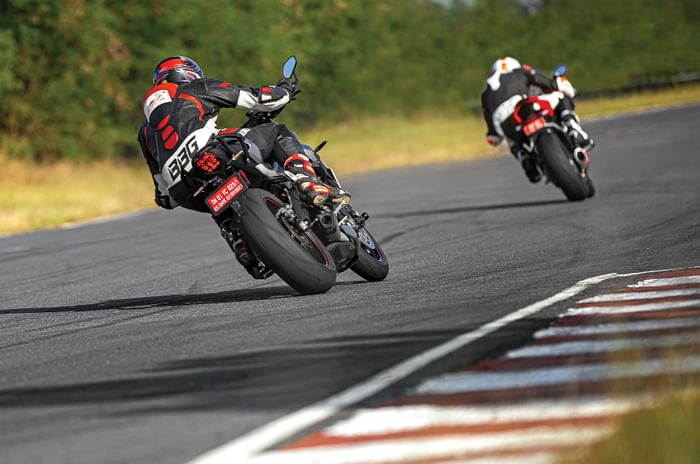
Logically, the RS is the winner of this comparison, but then again, this isn’t a very logical comparison, is it? It was only the closeness of the lap times that drove us to see how this comparison would pan out. Bottom line, these are two outstanding motorcycles and while the Triumph’s affordability and road usability are big advantages, the Panigale packs a level of seductiveness and desirability that few motorcycles on the planet can match, this Triumph included. Either way you choose, you’ll have chosen well!
VISHAL VENUGOPAL
Copyright (c) Autocar India. All rights reserved.

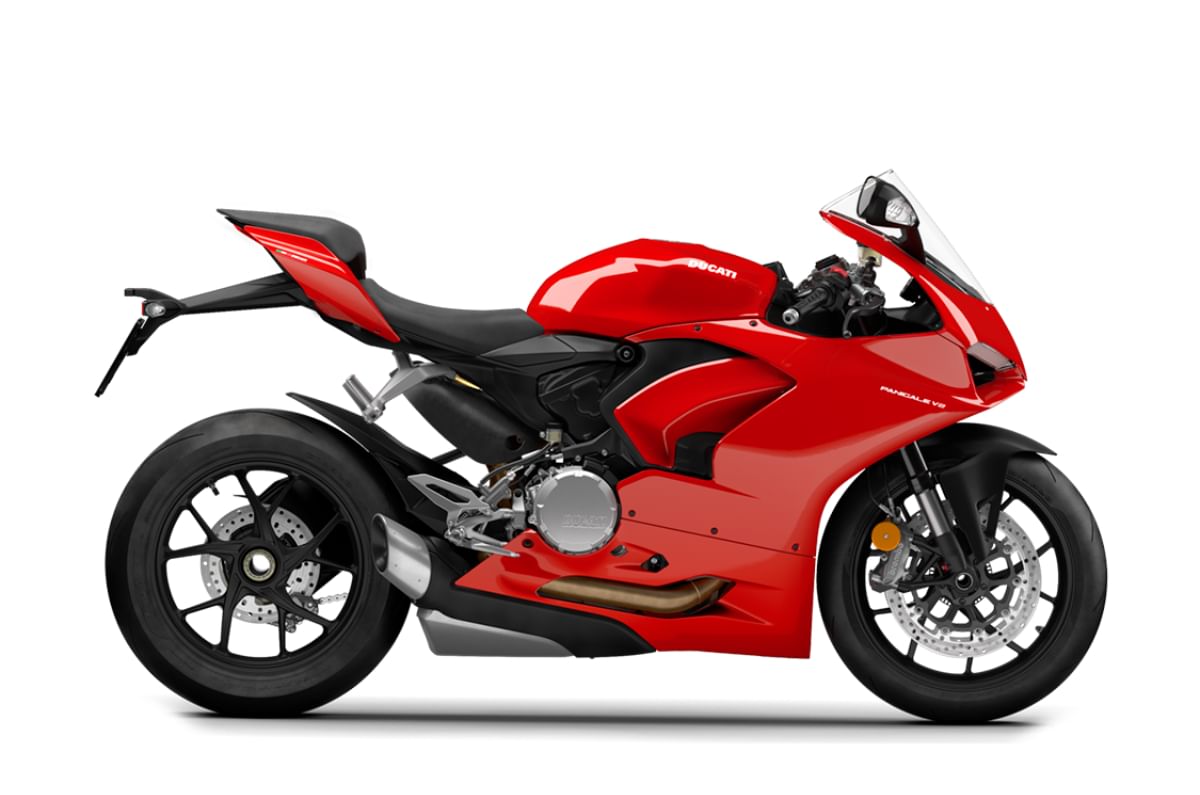

Comments
Member Login
Personal Details
No comments yet. Be the first to comment.